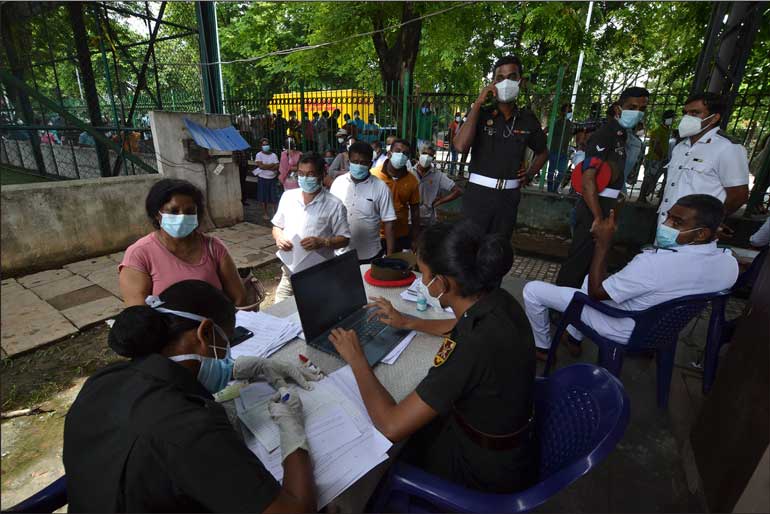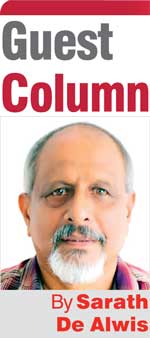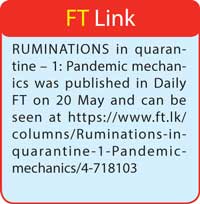Wednesday Feb 11, 2026
Wednesday Feb 11, 2026
Wednesday, 26 May 2021 00:00 - - {{hitsCtrl.values.hits}}

The political dogfight over the death count and the blame game over the vaccines not ordered is of no relevance to a people intimidated by an invisible pathogen under a dispensation that does not even pretend to have a way out of the crisis – Pic by Shehan Gunasekara
– Chinese Proverb
 The debate over the riches to be realised from the reclaimed oceanfront in our capital is over. The discourse mirrored a swing between uninspiring idealism and opinionated cynicism.
The debate over the riches to be realised from the reclaimed oceanfront in our capital is over. The discourse mirrored a swing between uninspiring idealism and opinionated cynicism.
Watching the debate, I was reminded of that aphorism with which the German thinker Friedrich Nietzsche dissected human nature and debunked the premise that every man had a price. That want true he said. But every man had a bait which he “cannot resist swallowing”.
“To win over certain people to something it is only necessary to give it a gloss of love of humanity, nobility, gentleness, self-sacrifice – and there is nothing you cannot get them to swallow.”
The debate on the Port City Commission Bill mirrored that Nietzschean view of human nature. It had the elements of slave’s morality of conceding power to the master. It also had the elements of deep psychological egoism that comes from raw power.
The Port City has been described as a turning point. It is claimed that it will offer ‘world class’ facilities. For it to be a turning point, the journey must also have end. A nation’s journey is a never-ending journey.
If 1917 was a turning point for Vladimir Lenin, 1985 was the year that Michael Gorbachev took a definite detour. If Mao Zedong reached a turning point in 1948, Deng Xiaoping diverted to his expressway in 1978.
If Jawaharlal Nehru took the high road of ‘Pancasila “1948, Atal Behari Vajpayee took the explosive Pokhran road of détente in 1998.
The journey of a nation is an enduring journey. Nations on their journeys through the ages have displayed the excellent habit of leaving charlatans by the wayside.
I do not understand the urgency that prompted the hurried debate and passage of the Port City Commission bill.
History will record that the operative legislation of the Port City was enacted when the nation was in the grip of an omnipresent sickness. When fear of death by an invisible pathogen engulfed the land. It is a date to be remembered. A time when human coexistence was under the most severe strain imaginable.
Now there is to be another inquiry to determine if it was passed with 148 or 150 votes. They say that politics is trophy hunting. You pull the trigger from a safe distance. Common sense would suggest that this discussion on what is to be done with those reclaimed ‘hectares of the Port City’ and by whom and how should have preceded the reclamation of the land.
Now it is not suggested that we have put the cart before the horse. We have only got ourselves a Master of all Carters with forbidding whip called ‘Renminbi’. The Master Carter has arrived with his carthorses and has now put shafts and the wheels in place. Quietly and slowly. He will put the carriage in to shape.
We are told that it will be of world class. For the sake of my grandchildren, I would sincerely hope that it will turn out to be so or strive to approximate that figure of speech of being truly ‘world class’.
We are told that it will be a turning point. Unfortunately, this sanguine sentiment has emanated from the bloke who invested in Greek bonds. The Greek bonds were dumped by investors. Only the Pope offered to pray for Greece.
 Staying indoors, keeping informed
Staying indoors, keeping informed
Staying indoors is not easy. The constricted space, physical and mental, generates an uneasy friction between what you are and what you wish to be.
Local TV channels oscillate between jaundiced judgment and dopey devotion. Having been a journalist at some point in my chequered career path, I think I am capable of a reasonable reading of the situation. Despite the deceit of defending free speech and respecting a free press, power regards journalists as an essential nuisance in normal times and an insidious impediment in times of crisis.
Since independence, we have not succeeded in fostering institutional resilience. But please remember. It is not because of the sudden onset of an autocratic tendency. My ruminations go back to 1974 when a mob marched into Lakehouse and set its library on fire. The mob, by the way was led by a nephew of Anagarika Dharmapala!
The idea of the Government in the business of manufacturing, moulding public opinion was made a respectable political principle under our first Republican Constitution. I am a regular, conscientious reader of the ‘Lankadeepa,’ the Sinhala broadsheet with the largest circulation in the country. Reading its pages today is a melancholy exercise of mapping the editorial mind that meanders between self-censorship and self-restraint.
Every sunshine story I read in that paper in these bleak times make me ruminate on the memories of D.B. Dhanapala, Julius Lanerol and Gunadasa Liyange who once edited the paper that published Martin Wickremesinghe’s classic anatomy of the 1956 awakening under the caption ‘Bamunukulaye Bindavateema’ – Breakup of the Brahmin Brood.
Those ruminations of giants in Sinhala print media were just an example. The media intimidated into dispassionate docility is the major concern in these ruminations.
The self-seduction in the media is a slow process. It happens with the little-by-little concessions made to please the powers that be. Gone are the days when the op-ed pages mattered. In the consumerist age what matters is circulation. The shocking headline that wavers between the ridiculous and the ribald gets the attention of the general reader.
There was a time when Editors decided what to report, when to report and how to report. Today the owners and publishers do that. Never mind who does it today. It all started with a two-thirds majority the electorate gave in 1970. The five-sixths majority given by the people in 1978 improved upon those transgressions. The two-thirds majority in 2020 will put the final masonry in place.
Nobody born after 1970 remembers the vibrant press in this country that existed even under colonial rule. A media operated by oligarchic interests attuned to the rhythm of whoever in power has become the norm. It started 50 years ago.
A vengefulness of the impotent
The third wave of the COVID virus has been devastating. A 14-day lockdown when early signs appeared before the New Year festival would have put us on a different trajectory. A lockdown has economic consequences. A lockdown of a minimal 14 days can also arrest the spread of the epidemic.
The refusal by the dispensation to weigh the health benefits of a 14-day lockdown as against the economic losses anticipated in my opinion, is a reckless disregard of proven health science and a cavalier embrace of abstract economics.
The relish with which the Opposition greets the increasing number of infections and the dead is absolutely callous.
The philosopher and Journalist Albert Camus in his novel ‘The Plague’ describes how a pestilence provokes despair, both maddening and irrational. “If only it had been an earthquake! A good shake and that is it. One counts the dead, one counts the living and the whole thing’s over and done with. But this rotten bastard of a disease! Even those who do not have it, carry it in their hearts.”
Even the uninfected are carrying the virus in their hearts.
The Chief Opposition Whip and Kandy District SJB Parliamentarian Lakshman Kiriella has called on the Government to give priority to members of the Maha Sangha and clergy of other religions in the State’s COVID vaccination programmes.
This appallingly self-serving suggestion indicates that the main Opposition group looks at the vaccination program to be hierarchically designed and not equity focused. Then how could they criticise the other side’s discretionary vaccination?
He wants it to cater to different political interests. To his mind, it is not a national imperative for the health of the people. In the middle of a pestilence, the Chief Opposition Whip wants to be the textbook pest, promoting hierarchical distribution of the lifesaving vaccine.
When Parliament met last week, an intensely rancorous confrontation erupted between Leader of the Opposition Sajith Premadasa and Minister of Health Pavithra Wanniarachchi. The Leader of the Opposition recited a long list of questions directed to the Health Minister. Linked to the COVID outbreak, the questions referred to measures taken or not taken to contain it.
An incensed Minister of Health (she hardly needs a reason to be incensed) refused to respond. She accused the Opposition of attempting to disrupt her focus and priorities in taming a virus now running loose. If an inept Government precipitated the spike, a callous Opposition should not exult in the resulting chaos and deaths.
This blame game provoked my ruminating on the word ‘schadenfreude’. It is German word now in the English lexicon. Pleasure derived from another’s misfortune. The German thinker Nietzsche called it the vengefulness of the impotent.
Now, it must be clearly established that this writer holds no brief for this dispensation. He finds its tribalism to be myopic and its parochialism contemptible. That said, the failure to contain the virus is a national disaster and every COVID-linked death is a death unnecessary.
The political dogfight over the death count and the blame game over the vaccines not ordered is of no relevance to a people intimidated by an invisible pathogen under a dispensation that does not even pretend to have a way out of the crisis.
So, each one of us, just as the people in Camus’s novel ‘must be content to live under the vast indifference of the sky’.